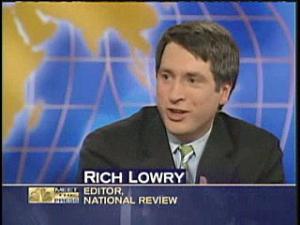I'm so sick of the false equivalencies and lack of context of the conservative commentators and pundits out there, who get opportunity time and time again to spin their failures as somehow the fault of Democrats.
On Meet the Press, David Gregory notes that the tone of the Bush administration changed from the promised "compassionate conservative/uniter, not a divider" to its take-no-prisoners partisanship reality. Rich Lowry acknowledges that it was so, but blames it on the sixteen year warfare of Democrats and Republicans refusing to acknowledge the legitimacy of the other party's president.
A couple of things…one, Bush had a very simple view of how this works. You run on your agenda, and then you’re elected and you try to pass your agenda. And that seems pretty straightforward and basically admirable to me. But a couple things happened with the tone. One, he had entered into Washington where there is this ongoing revenge warfare, between the parties. Where Republicans were going to get revenge for Iran-Contra with Whitewater and the Monica scandal and the Democrats were going to get revenge for that. And you had about a sixteen year period where neither side would really accept the legitimacy of the other party’s president.
Um, Rich? Was Bill Clinton legitimately elected to office? Was there an extraordinary and so-legally-questionable-that-SCOTUS-specifically-limited-the-precedent-to-that-one-case decision that placed Clinton in office? No? So what was the basis of the lack of respect of the legitimacy of Bill Clinton's claim to the presidency? Sour grapes over Iran-Contra.
Let's remember, Mr. "History in a Vacuum" Lowry, were the Republicans guilty of crimes in the Iran-Contra scandal? They were? Quelle suprise! Was Clinton guilty of anything besides bad investing in the Whitewater scandal? Hmmm....isn't that funny...he wasn't. So the last eight years have been bad for poor George Bush, forcing him to be the nasty partisan war criminal that he is because of a sixteen year partisan war based on reality on the Democratic side and on the Republican side based on what? Being pissed that they've been caught outside the law? Well, to quote another blogger, boo-freakin'-hoo. How typically Republican.
And for the record, it's unadulterated crap that the left would never accept Bush. In the days after 9/11, Bush coasted on record approval ratings, ratings that showed that the WHOLE country--right, left and sideways--were all pulling for him. He pissed it away with declaring war on a country that had nothing to do with 9/11 and ignoring the entire Gulf Coast during Katrina. The left looked at his actions, not some made-up reasoning of entitlement to the office.
Figures that once again, Lowry doesn't know his ass from his elbow. Why does he keep getting on these programs? Isn't it about time we get someone who knows what they're talking about?
Transcripts below the fold
GREGORY: Overall, that change in tone, that missed opportunity there…there was a real feeling that he (George W. Bush) would never be accepted. Karl Rove and others said, ‘You know what? The country—the left will never accept you, you gotta put your pedal to the medal here and go for the agenda.’ And that’s what they did.
LOWRY: A couple of things…one, Bush had a very simple view of how this works. You run on your agenda, and then you’re elected and you try to pass your agenda. And that seems pretty straightforward and basically admirable to me. But a couple things happened with the tone. One, he had entered into Washington where there is this ongoing revenge warfare, between the parties. Where Republicans were going to get revenge for Iran-Contra with Whitewater and the Monica scandal and the Democrats were going to get revenge for that. And you had about a sixteen year period where neither side would really accept the legitimacy of the other party’s president. And then also, I think it goes to more broadly to Bush’s capabilities. You know, he was much better as a “Decider” than a persuader. He was never good at making the argument and therefore, he didn’t put much effort into making the argument.


















